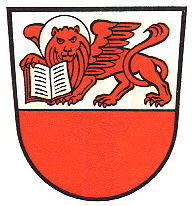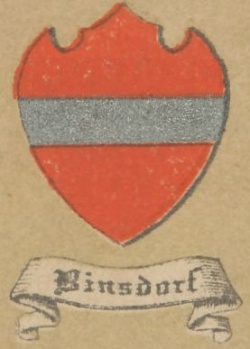Binsdorf: Difference between revisions
Knorrepoes (talk | contribs) m (Text replacement - "===Official blazon=== *(de) " to "{| class="wikitable" |+Official blazon |- |'''German''' | ") |
Knorrepoes (talk | contribs) m (Text replacement - ". ===Origin/meaning===" to ". |- |'''English''' | {{blazon wanted}} |} ===Origin/meaning=== ") |
||
| Line 14: | Line 14: | ||
| | | | ||
In von Silber und Rot geteiltem Schild oben der stehende, geflügelte rote Markuslöwe, mit den Vorderpranken ein aufgeschlagenes silbernes Buch mit rotem Schnitt haltend. | In von Silber und Rot geteiltem Schild oben der stehende, geflügelte rote Markuslöwe, mit den Vorderpranken ein aufgeschlagenes silbernes Buch mit rotem Schnitt haltend. | ||
|- | |||
|'''English''' | |||
| {{blazon wanted}} | |||
|} | |||
===Origin/meaning=== | ===Origin/meaning=== | ||
Binsdorf was founded as a city by the Counts of Hohenzollern, and the oldest seal, dating from 1378, thus shows the quartered arms of the Hohenzollern family. In the late 14<sup>th</sup> century the city was a possession of the Counts of Hohenberg and the seals showed the divided (silver and red) shield of the Hohenberg family. In 1454 the city became part of Austria, but the Austrian arms do not appear in the local seals before the 18<sup>th</sup> century. The silver and red shield, however remained the arms of the city. In the early 19<sup>th</sup> century a deer antler, derived from the arms of Württemberg was added in the upper half. | Binsdorf was founded as a city by the Counts of Hohenzollern, and the oldest seal, dating from 1378, thus shows the quartered arms of the Hohenzollern family. In the late 14<sup>th</sup> century the city was a possession of the Counts of Hohenberg and the seals showed the divided (silver and red) shield of the Hohenberg family. In 1454 the city became part of Austria, but the Austrian arms do not appear in the local seals before the 18<sup>th</sup> century. The silver and red shield, however remained the arms of the city. In the early 19<sup>th</sup> century a deer antler, derived from the arms of Württemberg was added in the upper half. | ||
Revision as of 08:01, 5 July 2022
This page is part of the German heraldry portal |
Heraldry of the World |
|
German heraldry:
|
Selected collector's items from Germany:
|
BINSDORF
State : Baden-Württemberg
District (Kreis) : Zollernalbkreis (until 1972 Balingen)
Incorporated into : 1971 Geislingen
| German |
In von Silber und Rot geteiltem Schild oben der stehende, geflügelte rote Markuslöwe, mit den Vorderpranken ein aufgeschlagenes silbernes Buch mit rotem Schnitt haltend. |
| English | No blazon/translation known. Please click here to send your (heraldic !) blazon or translation |
Origin/meaning
Binsdorf was founded as a city by the Counts of Hohenzollern, and the oldest seal, dating from 1378, thus shows the quartered arms of the Hohenzollern family. In the late 14th century the city was a possession of the Counts of Hohenberg and the seals showed the divided (silver and red) shield of the Hohenberg family. In 1454 the city became part of Austria, but the Austrian arms do not appear in the local seals before the 18th century. The silver and red shield, however remained the arms of the city. In the early 19th century a deer antler, derived from the arms of Württemberg was added in the upper half.
In 1959 the antler was replaced by the winged lion, symbol of St. Mark, the local patron saint.
| The arms on an 1877 poster |
The arms shown in an album from 1952 |
Contact and Support
Partners:
Your logo here ?
Contact us
© since 1995, Heraldry of the World, Ralf Hartemink 
Index of the site
Literature : Stadler, 1964-1971, 8 volumes.














